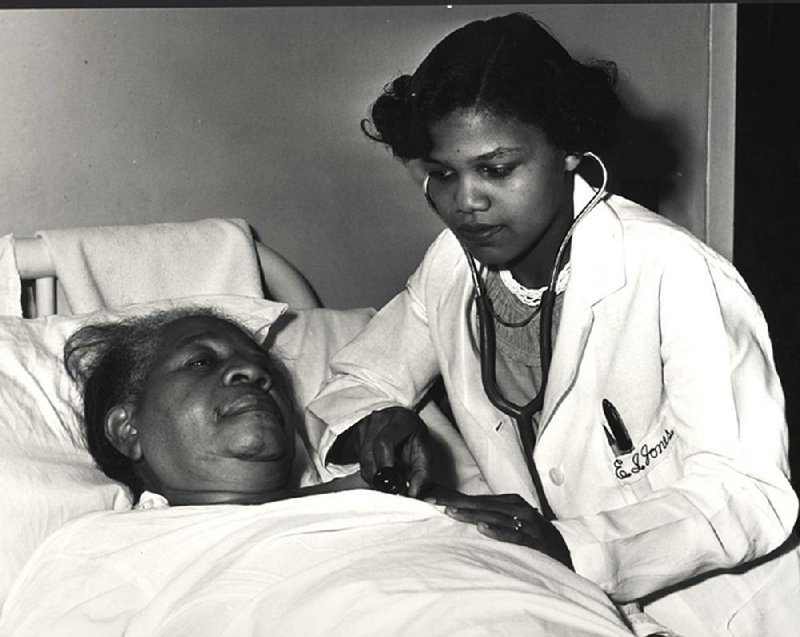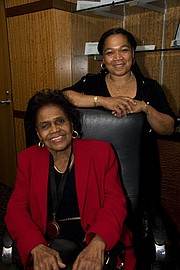Dr. Edith Irby Jones, the first black medical student to enroll at the University of Arkansas' medical school, and who went on to become an eminent physician on the national stage, died Monday. She was 91.
Jones was a woman of "firsts" who made national headlines as the first black person to matriculate at a previously all-white medical school in the South.
She also was the first black woman intern at Baylor College of Medicine Affiliated Hospital, the first female president of the National Medical Association and the only female founding member of the Association of Black Cardiologists, according to the Central Arkansas Library System Encyclopedia of Arkansas.
"I don't think that she understood the idea of 'no,'" said UAMS Chancellor Cam Patterson, who met Jones during a celebration of her life at the health sciences center last year.
"Her impact is on behalf of every African-American who went to medical school after her, and [on] the doors that she opened for so many people."
[Video not showing up? Click here to watch » https://www.youtube.com/watch?v=QwVVIKijux0]
According to the Encyclopedia and a 2006 interview with the Pryor Center for Arkansas Oral and Visual History, Jones was born as Edith Mae Irby near Conway in 1927.
Her childhood was marked by hardship, including her father's death, a bout of rheumatic fever that left her temporarily unable to walk or go to school, and her sister's death from typhoid fever.
In a transcript of that interview, Jones said she thought her sister might have survived had the family been able to pay for more frequent medical care. The experience as a little girl made her decide to become a doctor.
"I was gonna be a different kind of doctor," one who specialized in caring for people without money, she told an interviewer.
"Those who were less fortunate would get the kind of care that they needed ... that I was gonna do it as much as I could do it, and I was gonna instill into others that they must do it, too."
Jones attended historically black Knoxville College in Knoxville, Tenn. Of 12 black students who applied to what was then the University of Arkansas Medical College for 1948, Jones was the only one accepted, the Alabama Tribune reported at that time.
During her time at the Little Rock school -- all of which occurred years before the desegregation crisis in the city's public schools -- Jones was not allowed to share some facilities, such as dining areas, with white students.
She became an advocate for the civil-rights movement on nights and weekends, joining organizers as they traveled to schools and churches to talk about racial equality.
In a National Library of Medicine biography, Jones said her biggest supporter during those years was Dr. James B. Jones, a professor at the school that was later renamed the University of Arkansas at Pine Bluff. The pair married during her second year of medical school and raised three children.
After practicing for a few years in Hot Springs, Jones moved to Houston, Texas, with her family, where she became Baylor's first black female resident.
Dr. Toi Harris, associate provost of institutional diversity and inclusion and student service at that college, said Jones' legacy informs work on diversity issues on campus even today.
"She clearly was brilliant," said Harris, "[but] she wasn't sort of pigeonholed with any one group. Her impacts really cut across race, gender, ethnicity, all of it.
"The really positive example that she set really made it easier for others to follow behind."
Over decades of practice in internal medicine, Jones became an advocate for underprivileged patients, especially those living in Houston's inner-city Third Ward, where she had a clinic.
She also taught and lectured at multiple universities, including Baylor, where she helped lead a college summer program attended by Dr. Rodney Davis in the 1970s.
Davis, who is now chairman of the University of Arkansas for Medical Sciences urology department, said Jones was an early champion of efforts to train medical students in treatment of patients from disadvantaged backgrounds.
He remembered her as "very easygoing, very compassionate."
"It was always a comfort to me, knowing she's out there," he said. "She will be greatly missed."
During the course of her career, Jones held prominent roles, including her election as the National Medical Association president. The group is the largest professional association of black doctors.
She was also one of the founders of Mercy Hospital in Houston.
She received numerous awards and accolades, including a prize from the American College of Physicians and recognition from the city of Houston, where officials named one day in 1986 as Edith Irby Jones Day.
Clinics in Veracruz, Mexico, and Vaudreuil, Haiti, also were named for her, and a UAMS scholarship for students with financial need -- particularly those from underrepresented minority groups -- is endowed in her honor.
In a statement Tuesday, Gov. Asa Hutchinson praised Jones, whose experiences he said "inspired her to lead the charge for those who would follow ... [she] overcame all obstacles," he said.
"Many enjoyed better health, and many found professional opportunity they wouldn't have had without [her] leadership and courage."
Metro on 07/17/2019


